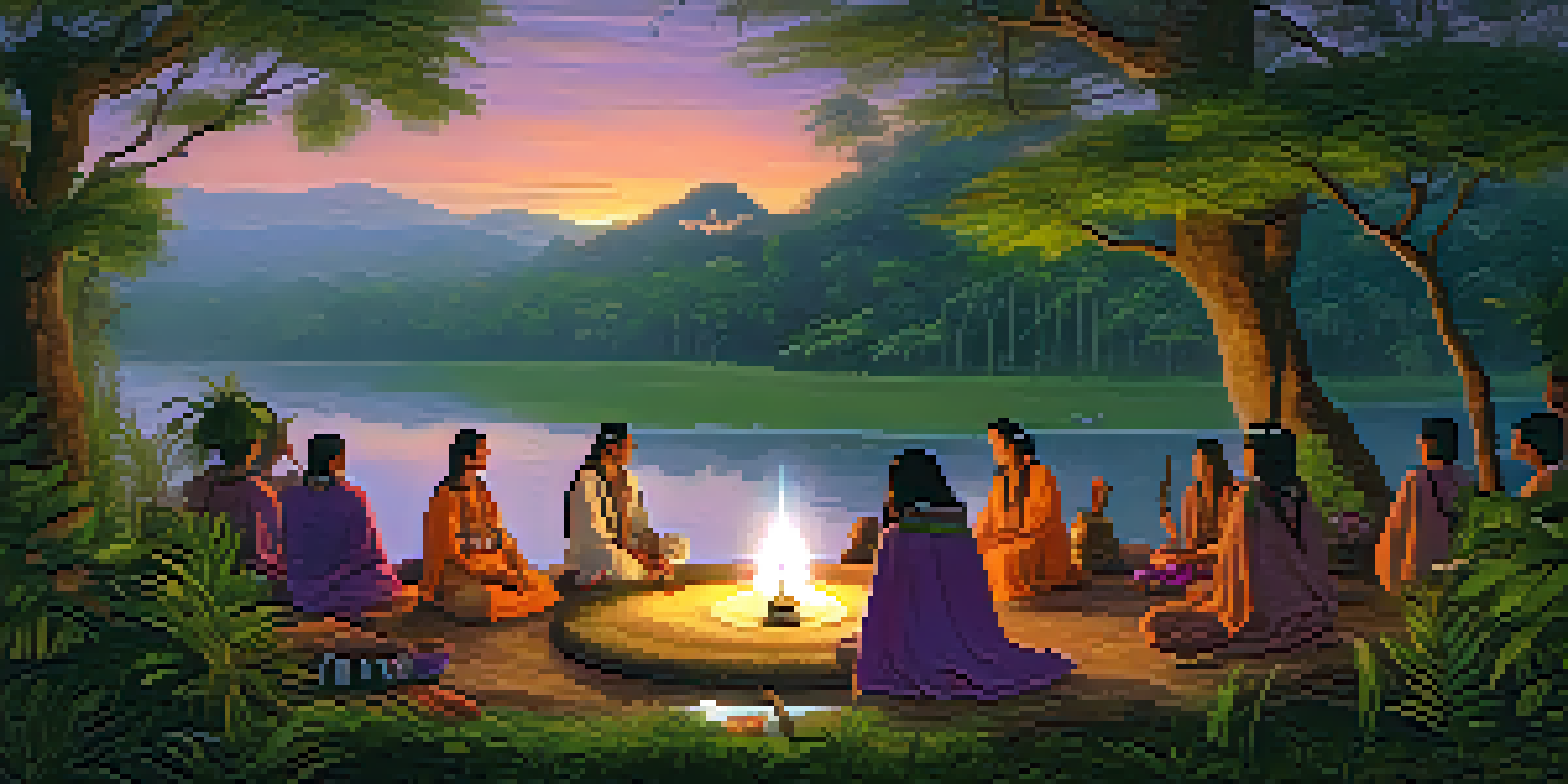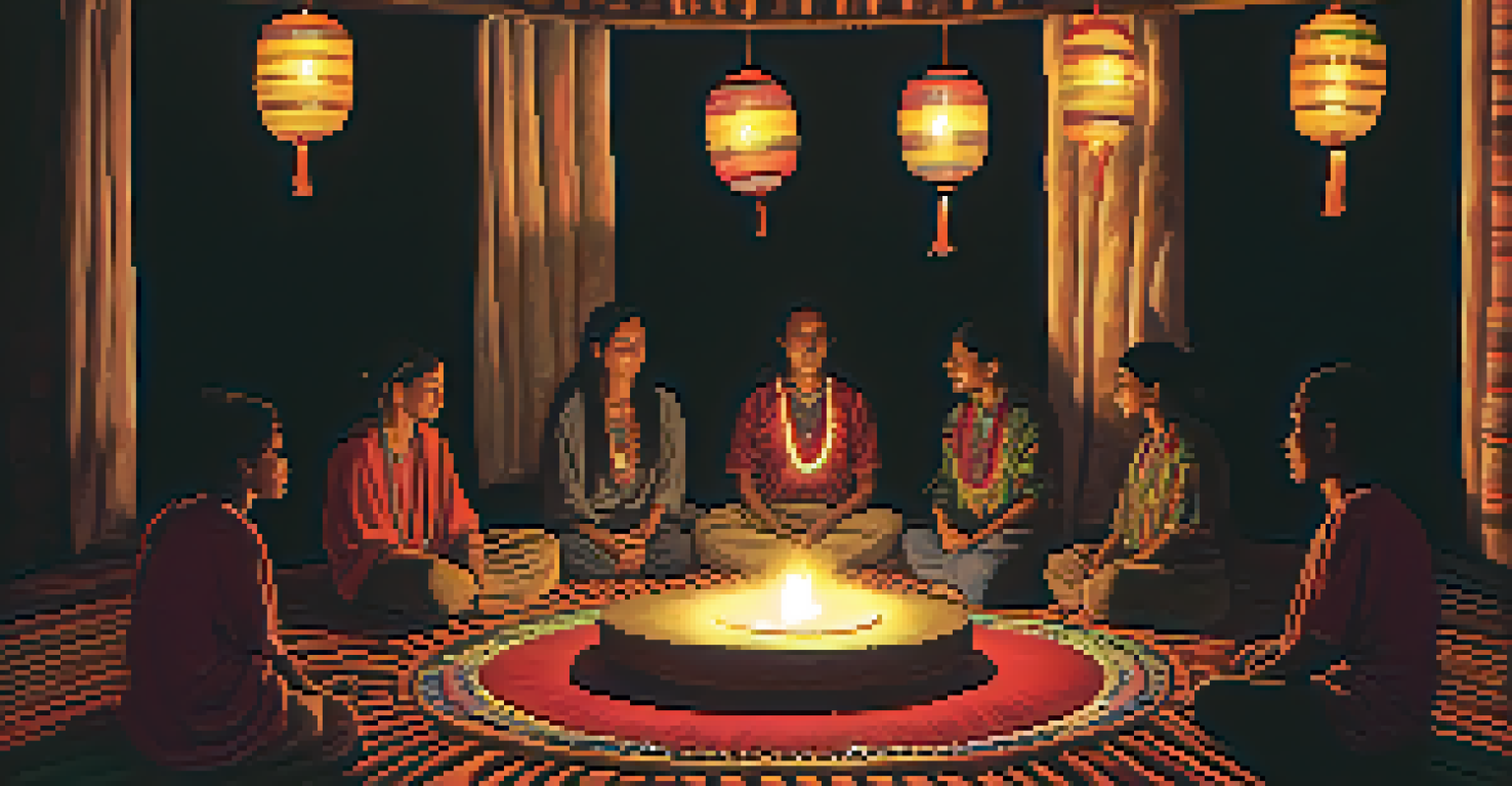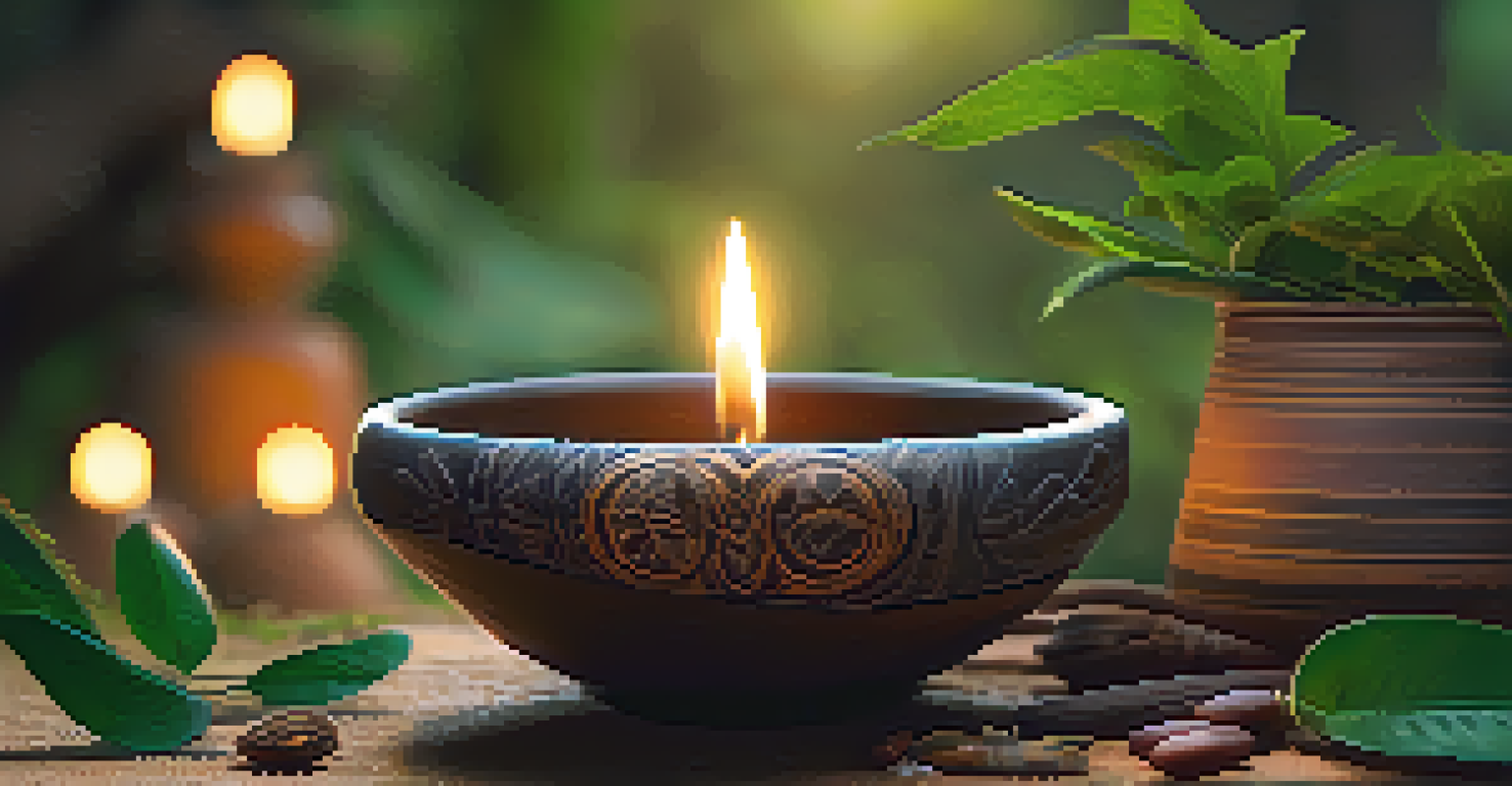Cultural Perspectives on Ayahuasca and Relationship Dynamics

Understanding Ayahuasca: A Cultural Overview
Ayahuasca is more than just a psychedelic brew; it's a spiritual experience deeply rooted in indigenous Amazonian cultures. Traditionally used in shamanic rituals, this powerful concoction is made from the Banisteriopsis caapi vine and the Psychotria viridis leaf, unlocking a realm of consciousness for those who partake. Its use has transcended geographical boundaries, attracting people worldwide seeking healing or enlightenment.
The greatest healing therapy is friendship and love.
In the Amazon, Ayahuasca is viewed as a sacred tool that connects individuals with nature, ancestors, and the spiritual world. The rituals surrounding its consumption often involve a shaman who guides participants through their journeys, ensuring they navigate the experience safely and meaningfully. This cultural significance contrasts sharply with the more casual approach sometimes adopted by Western users, highlighting the varying perspectives on its use.
The growing interest in Ayahuasca has sparked conversations about cultural appropriation and respect for indigenous practices. As more people seek out Ayahuasca experiences, it's essential to acknowledge the rich history behind it and the communities that have preserved its use for centuries. Recognizing these cultural roots can foster a deeper understanding of the brew's profound effects on personal and relational dynamics.
Ayahuasca and Its Role in Personal Growth
Many individuals turn to Ayahuasca seeking personal transformation, often in the context of relationship dynamics. The brew can provoke intense introspection, revealing underlying issues and patterns that may hinder personal connections. For those willing to confront their inner struggles, Ayahuasca can serve as a catalyst for significant change and growth.

During an Ayahuasca ceremony, participants may experience emotions and memories that have long been buried, providing an opportunity for healing past traumas. This process can lead to improved communication skills and emotional awareness, which are vital components for healthier relationships. By addressing personal challenges, individuals often find themselves better equipped to navigate their connections with others.
Ayahuasca's Cultural Significance
Ayahuasca is a sacred brew rooted in indigenous Amazonian practices, emphasizing the importance of cultural respect and understanding.
Furthermore, the shared experience of Ayahuasca ceremonies can foster a unique bond among participants. As individuals go through intense emotional journeys together, they can cultivate empathy and understanding, strengthening their relationships. In this way, Ayahuasca serves not only as a tool for personal growth but also as a bridge connecting people on a deeper level.
Cultural Perspectives on Relationships and Ayahuasca
Different cultures have unique views on relationships, and these perspectives influence how Ayahuasca is integrated into relational dynamics. In many indigenous communities, relationships are seen as interconnected and deeply influenced by spiritual well-being. The ceremonial use of Ayahuasca often reinforces these connections, emphasizing the importance of community and collective healing.
We do not inherit the earth from our ancestors; we borrow it from our children.
Conversely, in more individualistic societies, the focus may shift towards personal experience and self-discovery. This can sometimes lead to a more transactional view of relationships, where personal gain takes precedence over communal ties. Understanding these cultural differences helps illuminate why individuals approach Ayahuasca and relationships in varying ways, shaping their experiences during ceremonies.
Ultimately, recognizing these diverse cultural perspectives can enhance our appreciation for the role Ayahuasca plays in shaping relationship dynamics. It encourages us to reflect on our values and beliefs about connection, prompting a deeper exploration of how culture influences our interactions with others. By acknowledging these varying viewpoints, we can foster more respectful and meaningful engagements with both Ayahuasca and our relationships.
The Impact of Ayahuasca on Romantic Relationships
Ayahuasca can significantly affect romantic relationships, often acting as a mirror that reflects individual and shared issues. Couples who partake together may find themselves facing unresolved conflicts or emotional barriers that inhibit their connection. This shared vulnerability can either strengthen their bond or reveal fundamental incompatibilities, urging them to confront these challenges together.
For some couples, the experience can be transformative, opening up pathways for deeper understanding and communication. As they navigate the emotional terrain brought forth by the brew, partners may learn to express their needs and desires more openly. This newfound level of intimacy can lead to a more profound and fulfilling relationship, enhancing trust and connection.
Impact on Relationships
Ayahuasca can both challenge and strengthen romantic relationships by facilitating deep emotional exploration and communication.
However, it's essential to approach Ayahuasca with caution, as not all couples will experience positive outcomes. The intensity of the experience can amplify existing tensions, potentially leading to conflict if not navigated thoughtfully. Couples considering Ayahuasca should communicate openly about their intentions and readiness to explore their relationship dynamics in this unique setting.
Navigating the Aftermath: Integration and Relationships
Post-Ayahuasca integration is a crucial step in processing the experiences from the ceremony, especially regarding relationships. Participants often leave with profound insights and emotional revelations that can impact their connections. Taking the time to reflect and integrate these experiences can foster healthier interactions with loved ones.
In the aftermath of a ceremony, discussing insights with partners or close friends can be incredibly beneficial. This dialogue allows individuals to articulate their feelings and share how their experiences may have shifted their perspectives on relationships. By opening up this line of communication, participants can foster greater understanding and empathy among their loved ones.
Additionally, seeking support from integration circles or groups can provide valuable resources for navigating the changes that arise from Ayahuasca experiences. These spaces offer a platform for individuals to share their journeys, fostering a sense of community and support. By prioritizing integration, individuals can enhance their relationships, turning insights into actionable steps for personal and relational growth.
Ayahuasca Tourism: Ethical Considerations
The rise of Ayahuasca tourism has sparked discussions about the ethical implications of this phenomenon. Many travelers seek authentic experiences with indigenous shamans, but this can lead to exploitation and cultural commodification. It's essential to approach Ayahuasca tourism with respect and awareness of the cultural context from which it originates.
Ethical Ayahuasca tourism involves supporting local communities and engaging in responsible practices that honor their traditions. This means seeking out reputable facilitators who prioritize the well-being of participants and respect the cultural significance of the brew. By choosing to participate in ethically sound ceremonies, travelers can contribute to the preservation of indigenous practices instead of undermining them.
Ethical Ayahuasca Tourism
The rise of Ayahuasca tourism necessitates ethical considerations to prevent exploitation and honor the cultural contexts from which it originates.
Furthermore, as more people share their experiences online, there's a responsibility to promote respectful and informed discussions about Ayahuasca. Encouraging awareness and education around the cultural origins of Ayahuasca can foster a deeper appreciation for its significance. By engaging ethically with Ayahuasca tourism, individuals can help ensure that this powerful tradition continues to thrive in its authentic form.
The Future of Ayahuasca in Contemporary Society
As interest in Ayahuasca continues to grow, its role in contemporary society is evolving. More people are recognizing its potential for healing and personal growth, leading to an increase in retreats and workshops worldwide. This popularity raises questions about how Ayahuasca can fit into modern lifestyles while respecting its cultural roots.
The future of Ayahuasca will likely involve a balance between spiritual practices and modern therapeutic approaches. Some mental health professionals are exploring the potential benefits of Ayahuasca as an adjunct to traditional therapies, recognizing its ability to promote introspection and emotional healing. This integration could pave the way for more accessible and informed experiences for those seeking support.

However, it's crucial to approach this integration with caution and respect for the indigenous cultures that have long held Ayahuasca sacred. By fostering dialogues between traditional practices and modern therapeutic contexts, a collaborative future can emerge. This evolution will not only honor the cultural significance of Ayahuasca but also provide valuable insights into the complexities of human relationships in contemporary society.